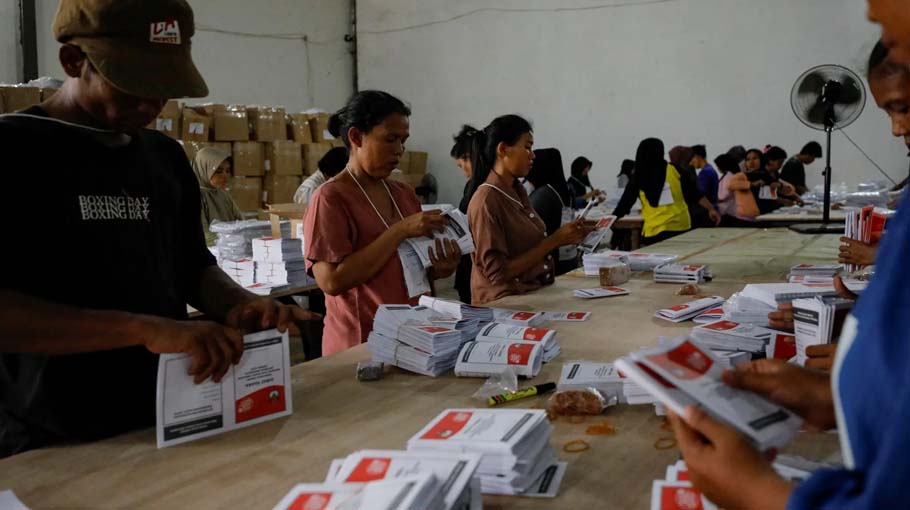Will 2024’s regional head elections strengthen or undermine Indonesian democracy?

2024 promises to be a busy year for Indonesian democracy. Voters will elect a new president, 20,462 national and regional legislators and, later, some 548 regional heads. These are the provincial governors, district heads and municipal mayors responsible for delivering many basic services under Indonesia’s system of decentralised governance.
As Indonesia’s democratic transition has stagnated and shown increasing signs of regression, direct election of regional heads remains popular among voters even as some elites have again soured on the idea. Well-known shortcomings including widespread vote-buying and civil service involvement in politics will all likely feature again in this election cycle. But there are additional factors that may either strengthen or further undermine the quality of Indonesian democracy in 2024.
2024 marks the first time that all regions nationwide will hold regional head elections in the same year and on the same day. This will align national and regional development planning cycles, confine campaign disruptions to roughly one year out of five and — theoretically — drive efficiencies of scale in election administration.
In order to synchronise differing regional election cycles, regional leaders whose five-year terms expired in 2022 and 2023 have been replaced by acting regional heads, drawn from the ranks of senior civil servants through a selection process widely criticised for lacking transparency. This means that almost half of all regions — those that last held regional head elections in 2017 and 2018 — will have been without an elected incumbent for at least a year at the time the 2024 elections are held.
While acting regional heads cannot stand for election while remaining active in that capacity, there appears to be nothing stopping them from resigning and then running as a candidate, having used their time in office to strengthen their political base. A more insidious and likely prospect is that President Joko Widodo’s (Jokowi’s) administration is using its influence over acting regional heads to further its own political interests.
A recent significant development is the government’s manoeuvring to bring the date of the regional head elections forward from November to September 2024. The official explanation for this move is to eliminate the need to extend the appointment of acting regional heads (and appoint new ones in regions where terms end in 2024) if there are delays in finalising election results and enable the simultaneous inauguration of new regional heads on 1 January 2025. But the real reason is likely a belated realisation by political elites that an earlier poll date better serves their interests.
The November election date was originally set through a 2016 amendment to the Regional Head Elections Law at the beginning of Jokowi’s first term. In 2021, during deliberations to set the date of the 2024 presidential election, February was chosen after April was dismissed for pushing a possible second-round presidential poll too close to the regional head elections in November. Bringing forward the regional head elections to September will have precisely the same effect.
This presents a significant logistical challenge for the General Elections Commission and its regional equivalents. It may also require shortening the campaign period for regional head elections to only 30 days instead of the typical 70–80 days, potentially favouring incumbents over newcomers.
But for Jokowi, a September election would mean that he is still in power and better able to promote his preferred candidates, including members of his own family. His youngest son Kaesang Pangarep, initially slated to contest the 2024 Depok mayoral election on the southern outskirts of Jakarta, suddenly finds himself chairman of Jokowi-aligned Partai Solidaritas Indonesia and being floated as a potential candidate in the Jakarta gubernatorial election. And his son-in-law Bobby Nasution, currently mayor of Medan, is widely anticipated to run for governor of North Sumatra.
Allegations have emerged of subtle interference by state security agencies to thwart the campaign activities of presidential candidates Ganjar Pranowo and Anies Baswedan, to the benefit of third-time presidential contender Prabowo Subianto and his running mate — Jokowi’s eldest son Gibran Rakabuming Raka. Remaining in power until regional head elections are held would maximise the potential for similar interference strategies in regional campaigns.
Most political parties are also in favour of the change because of the opening it creates for legislators with executive aspirations to have their cake and eat it too.
The Regional Head Elections Law requires that sitting legislators resign their position to contest regional head elections. This has meant that if a recently elected legislator subsequently ran for regional head but was unsuccessful, they would be left empty-handed. But if legislators elected in 2024 are not sworn in until October, as per the schedule for the national parliament, a September election would mean that legislators-elect could run for regional head without giving up their seats.
Both the government and parliament were initially reluctant to be seen as pushing a change to the election date, suggesting an awareness that the official reasons for it are unconvincing. But after abandoning an earlier proposal that the executive change the date using an emergency method of law-making, it is now agreed that the parliament will do so by making limited amendments to the Regional Head Elections Law.
This episode demonstrates that Jokowi is not limiting his self-acknowledged electoral ‘meddling’ to only the presidential contest. More broadly, it suggests that even though direct elections for regional heads are safe for now, they remain vulnerable to the forces that are gradually eroding the quality of Indonesia’s democracy.
Chris Morris is a PhD candidate at the Coral Bell School of Asia Pacific Affairs at The Australian National University.
East Asia Forum




